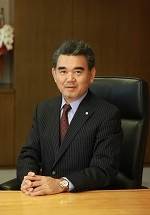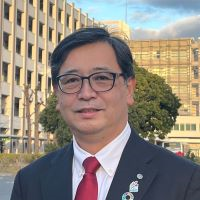Director’s message
 Dr. Mitsuo Ochi
Dr. Mitsuo Ochi
Director, Organization of the Leading Graduate Education Program,
President, Hiroshima University
In an increasingly globalized modern society, a variety of issues, including the widening economic gap, disaster and energy problems, global warming, and environmental pollution, present a threat to the sustainable development of humans across national borders. Since these issues are complexly intertwined with various factors, including history, society, culture, the natural environment, and technology, construction of a new knowledge system is necessary to find solutions.
In 2011, Hiroshima University established the Phoenix Leader Education Program (Hiroshima Initiative) for Renaissance from Radiation Disaster as one of the Programs within the Leading Graduate Schools supported by the Ministry of Education, Culture, Sports, Science and Technology (MEXT). This program aims to develop global leaders who will be able to resolve the global issue of recovery from radiation disasters based on an interdisciplinary academic field transcending the traditional framework of academic and research disciplines.
In the process of contributing to the recovery of Hiroshima after the atomic bombing, we have developed as a comprehensive research university with a unique mission based on our founding principle: “A single unified university, free and pursuing peace.” Through this process, we have accumulated the results of research on the impact of radiation on human health and radiation medicine, as well as the results of social scientific research on disaster recovery. Since 2004, we have also worked to improve the radiation medical system in Japan as a national hub for radiation emergency medicine in case of a radiation disaster.
When the Fukushima Daiichi Nuclear Power Plant accident occurred in 2011, we dispatched radiation medicine support teams comprising over 1,300 staff members in total. Since then, we have been involved in various support activities to utilize our accumulated experience and knowledge to its fullest extent for the successful recovery of Fukushima.
Our Leading Graduate Education Program, which has been created based on this experience, is an important graduate level research program that is unique to Hiroshima University and builds on its stated mission. To further develop and enhance this program, the Leading Program Organization Steering Committee was established with our President as the director. The committee, comprised of the deans of all the university’s graduate schools, is tasked with administering the program from a university-wide perspective.
Hiroshima University was adopted as one of the institutions designated under MEXT’s Program for Promoting the Enhancement of Research Universities in 2013, and was subsequently selected as one of Japan’s 13 universities for Category A of the Top Global University Project initiative administered by MEXT in 2014. Encouraged by this, we aim to become one of the world’s top comprehensive research universities by further promoting our globalization. Through the Leading Graduate Education Program, with our concerted efforts, we intend to establish graduate education programs which serve as global standards to support the safety and security of people around the world. To develop human resources able to share in our aim, we have developed a graduate student support system that allows our students to be fully devoted to their studies. We welcome those willing and able to share our dreams and hopes.
Program Director’s message

TSUGA Kazuhiro
Executive Vice President
(Community Collaboration, Funding and Alumni Associations)
Nuclear disasters cause health damage and environmental pollution by radiation. They also have a pervasive influence on people’ s minds and society, including reputational damage, and may even bring about the collapse of communities. Immediately following the Fukushima Daiichi Nuclear Power Plant accident, Hiroshima University has been engaged in reconstruction support activities, dispatching medical support teams to Fukushima Prefecture, and functioning as a hub for radiation emergency medicine in Japan. Through these activities, we have learned that the recovery from a nuclear disaster requires broad, interdisciplinary knowledge and skills drawn from a range of academic fields including radiation and medical science as well as environmental and social science. We have also realized that people able to grasp the essence of a situation from a broader perspective, and who possess strong will and the leadership skills to confront these challenging issues are necessary for providing successful reconstruction support. Since nuclear disasters have an impact on a global scale, cooperation with the international community and international institutions is also indispensable for addressing such disasters.
To develop global leaders with these capabilities, the Phoenix Leader Education Program (Hiroshima Initiative) for Renaissance from Radiation Disaster was established through the mobilized efforts of Hiroshima University based on its historical experience, supporting Hiroshima’ s recovery from the atomic bomb, and the response and reconstruction following the Fukushima nuclear disaster. Students in the program acquire broad, interdisciplinary knowledge and skills, and are involved in creative endeavors to help resolve the issues which fall within their specific areas of expertise. They deepen their practical knowledge through active participation in Fukushima and Chernobyl on-site fieldwork, as well as internship programs at the IAEA and other international institutions. Both faculty members and students devote maximum effort to building this exceptional research program, the only one of its kind in the world and unique to Hiroshima University, into an internationally-recognized and world-renowned graduate school program.
It is my sincere hope that as global leaders the students with a doctoral degree from this program will continue to inspire and support the residents of Fukushima Prefecture, will offer hope to those affected by disaster around the world, and will contribute to furthering the goal of a safe and secure global society.

